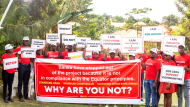Most of Europe’s largest 50 banks have rejected EACOP oil pipeline
Samuel Okulony, Environment Governance Institute: info@egiuganda.org
Abiud Onyach, Digital Communications, StopEACOP Campaign, abiud.onyach@350.org
Ryan Brightwell, BankTrack: ryan@banktrack.org

Samuel Okulony, Environment Governance Institute: info@egiuganda.org
Abiud Onyach, Digital Communications, StopEACOP Campaign, abiud.onyach@350.org
Ryan Brightwell, BankTrack: ryan@banktrack.org
The success
As at the end of 2024, the East African Crude Oil Pipeline project (EACOP) has still not received financial close. Sources including in the Ugandan government acknowledge the role of civil society campaigners in dissuading commercial banks from financing the project as crucial.
BankTrack's role
BankTrack has advocated for financial institutions' withdrawal from the highly damaging EACOP project since 2018, through engagement with banks, awareness raising about the project's impacts, and as a founding member of the #StopEACOP coalition since 2021. We engaged in writing with the banks that withdrew, calling on them to make a public statement committing not to finance the project, and published and distributed a series of Finance Risk Updates on the project.
Last September, Uganda’s minister for hydrocarbons claimed that at least seven European banks have committed, in private, to financing TotalEnergies’ East African Crude Oil Pipeline project (EACOP) despite the extreme risk it poses to people and the environment. However, new engagement and policy analysis from BankTrack covering the 50 largest European banks shows a dwindling number of European bank candidates are prepared to finance the project.
The extent of the banking sector's rejection of TotalEnergies’s $5 billion EACOP project is unprecedented in the oil and gas industry. In total, 28 banks headquartered in Europe have either publicly ruled out finance for the project, or have policies in place that would rule out finance for any new oil pipeline project. Globally, this total now stands at 42 banks.
Prior to September 2024, the total number of banks globally that had publicly committed not to finance the EACOP stood at 27, including 13 headquartered in Europe. Since then, BankTrack has analysed the policies of the largest 50 banks headquartered in Europe by assets, and identified eight additional banks with policies or regional approaches that would preclude finance for EACOP. Letters were sent by BankTrack and partner organisations to all remaining European banks on this list. Following this, seven more European banks confirmed they would not be financing the project. These were Bank of Ireland (Ireland), BBVA (Spain), Erste Group (Austria), KBC (Belgium), NatWest (UK), Nordea (Finland) and Raiffeisen Bank International (Austria).
While this sends a clear signal to the project sponsors that the project is beyond most banks' risk appetite, a number of banks have not yet ruled out finance. The largest European banks that have so far not ruled out finance for the damaging project, in order of asset size, are: UBS (Switzerland), Lloyds (UK), Caixa Bank (Spain), Danske Bank (Denmark), Sberbank (Russia), Commerzbank (Germany) and SEB (Sweden).
Switzerland’s UBS was not involved in project finance prior to its acquisition of Credit Suisse. Although Credit Suisse had committed not to finance the EACOP in 2021, UBS has not confirmed that this commitment applies to the merged bank. Caixa Bank responded without confirming its position, while the remaining banks did not respond to BankTrack’s requests for a comment.
Richard Senkondo, Executive Director of the Organization for Community Engagement (OCE) in Tanzania, said: “Financial close for the EACOP project has missed one deadline after another. TotalEnergies and its EACOP partners have already been forced to put more of their own money into building this dangerous pipeline, which will leave them holding more of the risk. Total should accept that the writing is on the wall, and stop throwing good money after bad, before impacts on communities, water resources and wildlife get even worse.”
Samuel Okulony, Chief Executive of the Environment Governance Institute Uganda, said: “The growing number of banks withdrawing from and refusing to finance EACOP highlights the disastrous nature of this project. We thank those banks that have taken a firm stand, whether by implementing stricter policies or rejecting fossil fuel investments. This is more than a financial decision, it is about standing with the Ugandan and Tanzanian people and committing to a future that prioritizes communities and the environment over short-term profits.”
Ryan Brightwell, Human Rights campaign lead at BankTrack in the Netherlands, said: “If Total really does have seven European banks lined up to finance this disaster in the making, we urge these banks to talk to affected communities before they commit their money. They should make sure they know about the tragic impacts the project is already having on the livelihoods and environment first-hand. European banks that have not yet made their positions clear should do so now.”
The StopEACOP campaign group, of which BankTrack is a member, has previously warned that banks that proceed with financing face imminent litigation and complaints.
The full list of banks that have been approached regarding the project, and their responses, is available here.


